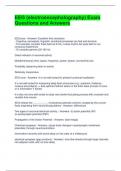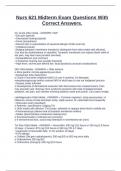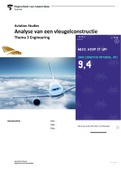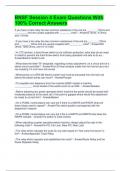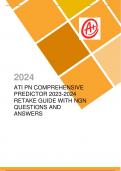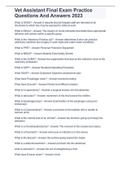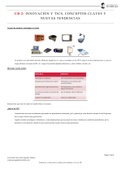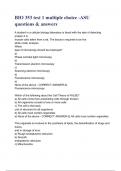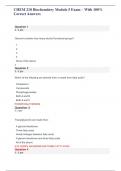Coagulation and Haemolytic Disorders
Endothelium
● Endothelial cell splay major role, not just a barrier from tunica intima
● Control platelet inhibition and activation and maintenance
● Controls TF expression, vWF secretion ie pro-thrombosis
● Any changes (damage/infection) will affect all it’s properties
Platelets
● Platelets are very necessary for coagulation. If have low count will need platelet transfusion. Not as
complicated as whole blood transfusion as they aren’t living cells
● Each fragment has: mitochondria, tubular systems, [open] phospholipid, electron dense granules
(nucleotides, ADP, Ca2+, serotonin), proteins (thromboxane from arachidonic acid cascade)
○ ADP and thromboxane are aggregation agents. Induce cross linking between platelets and
activates more platelets.
○ Receptors: GPIa-IIa for collagen binding, GPVI for intracellular binding, GPIb-IX-V for vWF
binding
● Platelet adhesion to collagen → activates receptor proteins to release vWF → more
platelets activated
● Activated platelets initiate coagulation cascade → thrombin + fibrin generation →
clot stabilisation
● Activated platelets undergo shape change to form filopodia and release granule contents through
exocytosis
● Resting state → activated state from conformational change in αIIβ3 receptor,
which promotes binding to fibrinogen and vWF and furthermore. These can act as
bridges to αIIβ3 receptors on adjacent cells
● Platelets pathology can be from hyperactivation (thrombosis) or more rarely, from activation
deficiency despite normal count
○ Platelet aggregometer. In presence of platelet activator substance (eg ADP) and measure
light transmission. Can measure level and speed of aggregation. Differs from blood film
which only shows number and shape when inactivated which could show them as ‘normal’
● Most anti-thrombotic drugs have active sites on platelet cell surface for activation, aggregation and
adhesion inhibitors
Coagulation Factors
● The factors are proteins (enzymes or cofactors) that act as serine proteases on
one another. Ultimately leading to the generation of thrombin → fibrinogen →
fibrin clot
● Is essentially an amplification process
● In vivo, all pathways and ‘primary/secondary’’ haemostasis happen simultaneously. This is known
as the cell based model
Endothelium
● Endothelial cell splay major role, not just a barrier from tunica intima
● Control platelet inhibition and activation and maintenance
● Controls TF expression, vWF secretion ie pro-thrombosis
● Any changes (damage/infection) will affect all it’s properties
Platelets
● Platelets are very necessary for coagulation. If have low count will need platelet transfusion. Not as
complicated as whole blood transfusion as they aren’t living cells
● Each fragment has: mitochondria, tubular systems, [open] phospholipid, electron dense granules
(nucleotides, ADP, Ca2+, serotonin), proteins (thromboxane from arachidonic acid cascade)
○ ADP and thromboxane are aggregation agents. Induce cross linking between platelets and
activates more platelets.
○ Receptors: GPIa-IIa for collagen binding, GPVI for intracellular binding, GPIb-IX-V for vWF
binding
● Platelet adhesion to collagen → activates receptor proteins to release vWF → more
platelets activated
● Activated platelets initiate coagulation cascade → thrombin + fibrin generation →
clot stabilisation
● Activated platelets undergo shape change to form filopodia and release granule contents through
exocytosis
● Resting state → activated state from conformational change in αIIβ3 receptor,
which promotes binding to fibrinogen and vWF and furthermore. These can act as
bridges to αIIβ3 receptors on adjacent cells
● Platelets pathology can be from hyperactivation (thrombosis) or more rarely, from activation
deficiency despite normal count
○ Platelet aggregometer. In presence of platelet activator substance (eg ADP) and measure
light transmission. Can measure level and speed of aggregation. Differs from blood film
which only shows number and shape when inactivated which could show them as ‘normal’
● Most anti-thrombotic drugs have active sites on platelet cell surface for activation, aggregation and
adhesion inhibitors
Coagulation Factors
● The factors are proteins (enzymes or cofactors) that act as serine proteases on
one another. Ultimately leading to the generation of thrombin → fibrinogen →
fibrin clot
● Is essentially an amplification process
● In vivo, all pathways and ‘primary/secondary’’ haemostasis happen simultaneously. This is known
as the cell based model


